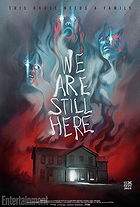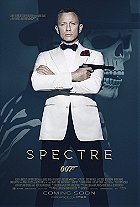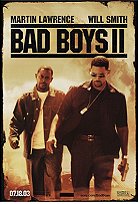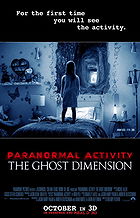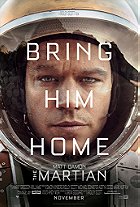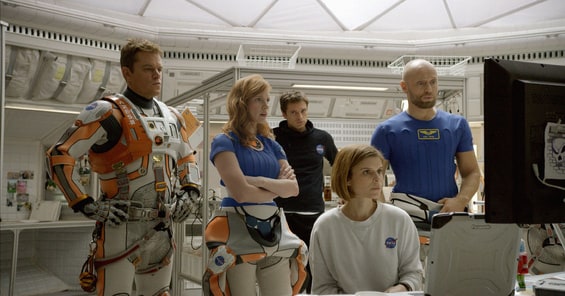Posted : 9 years, 7 months ago on 14 November 2015 05:43
(A review of
"Come with me if you want to live! NOW, SOLDIER!"
It has now been six years since the abortion that was McG's Terminator Salvation was met with substandard box office and critical mauling, posing a challenge for any filmmaker bold enough to pursue further sequels. There were not many logical places for the series to go, thus 2015's Terminator Genisys functions as both a sequel and a reboot, avoiding another future war movie by forcing a story set before Judgment Day to return the series to its roots. Genisys is barely a movie at all - it's a concept of a movie; a vague mishmash of half-baked ideas and potentially interesting scenes strung together not to tell a worthwhile story, but to fill out a balance sheet. Indeed, it solely exists to plot a workable new path for the franchise, paving the way for more sequels to allow Skydance to keep beating this dead horse for all that it's worth until the rights revert back to James Cameron in 2019. And with a soft PG-13 rating in place forbidding the visceral delights of the first two Terminator movies, Genisys feels safe and generic.

In the apocalyptic future war, human resistance leader John Connor (Jason Clarke) spearheads an attack on Skynet headquarters with help from right hand man Kyle Reese (Jai Courtney), in the process delivering a devastating blow that may finally end the war against the machines. But it is discovered that a T-800 Terminator has been sent back in time to 1984 to kill John's mother, Sarah (Emilia Clarke), to ensure that that he is never born. Kyle volunteers to serve as Sarah's protector, but upon arrival in 1984, he discovers that Sarah is already aware of the situation, locked in warrior mode and able to protect herself, aided by her lifelong Terminator guardian “Pops” (Arnold Schwarzenegger). Aiming to prevent Judgment Day, Sarah and Pops have created a time machine of their own, planning to travel forward in time to 1997 to stop Skynet before it goes live. But apparently the timeline has been altered and Kyle has memories of a future which hasn't happened yet, and they need to travel to 2017 instead. And on it goes.
Every time an R-rated franchise is continued with a PG-13 instalment, the press strategies are identical, with the studio, actors, and even the blind fan-boys wanting us to believe that PG-13 is no big deal, because it will (somehow) still be violent, and what matters the most is the script and story. Funnily enough, Arnie actually satirised such blatant lies in Last Action Hero back in 1994, with his character explaining that “In this movie we only kill 48 people. In the last one we killed 119. But we make up for it with a good story, emotions, depth, dimensions.” Big surprise: Genisys's PG-13 rating is a much bigger deal than we have been led to believe. Perhaps it could have worked if it did have a smart screenplay, but Genisys is a dumb action film, lacking the smarts and heart of the original Terminator. It's a numbing succession of brainless action sequences, and without the visceral punch of an R rating, there is not much to see here.

Genisys is not just a Terminator reboot, but a DC Comics-esque multiverse reboot. It's a poor excuse for the filmmakers to create a grab-bag of every single element that people liked from the previous movies; Sarah is already a badass, there's a T-1000 (played by Byung-hun Lee), there's another de-aged Arnold T-800 (with improved CGI), and they've recreated the main plot thrust of T2, with the heroes trying to destroy Skynet before Judgment Day erupts. Genisys also copycats another notable aspect of T2, with a relationship between Sarah and "Pops." A more appropriate title for the movie would be Terminator FanService. But then again, this is a PG-13 movie, so they cannot even do the fan service thing properly. Also, turning Arnie's ruthless T-800 into a sidekick for a wise-ass kid was a bad idea back in 1990, and having him as a gentle father figure is just as ill-advised here. I miss Arnie the hardcore killer.
Genisys is easy to follow, but examining the narrative too closely is a bad idea, with paradoxes and unanswered questions. The question of who sent Pops back in time is a real head-scratcher, and the script politely refuses to answer the query, with the T-800 explaining that his files were erased. But the biggest head-scratcher is the need for Sarah and Pops to build a time machine to go forward in time. Time-travel exists in the Terminator franchise in order for people and cyborgs to go back in time to change things, which is understandable, but why use it to travel forward? Time goes forwards in the first fucking place! Instead of jumping ahead thirty years, Sarah, Kyle and Pops could have spent that time improving their tactics and arsenal, keeping an eye on the Skynet situation, remaining one step ahead, and could have even destroyed Skynet whilst it was still in beta. But instead, they go for the ticking clock of Terminator 3 (hey look, another idea stolen from a past movie), even though it's incredibly idiotic that they aim to show up with limited time on their side, and just wing it.

The marketing campaign for Genisys is one of the poorest in recent memory, with the bargain basement posters, and the trailers which spoiled all of the movie's surprises. The big “twist” is that John is now the villain. But rather than the villain being a Terminator who looks like John, it actually is John Connor whose genetics were tampered with, and now he's Skynet's guardian to safeguard his own future existence. Frankly, this concept is unforgivable. John has always been mankind's saviour in the future war, but now it's all for naught. Perhaps this decision was made to sidestep the need for a sex scene between Kyle and Sarah, because PG-13. There are some interesting thematic undercurrents in the screenplay by Laeta Kalogridis and executive producer Patrick Lussier - particularly in regards to our growing reliance on screens in a modern world dominated by Google, Microsoft and Apple; and with Sarah standing up for her right to choose a mate rather than letting her supposed fate dictate that she must climb into bed with Kyle - but the movie is more interested in prolonged action scenes and terrible humour. Heavens me, the attempts at comedy are woeful, especially a hideous running joke that Pops cannot smile properly despite repeated attempts. Pops even makes a comment about Kyle's endowment, while another scene involves Pops getting a mugshot while the Cops theme plays in the background. Holy shit.
At least there is colour to the movie. One of Terminator Castration's many, many flaws is its desaturated cinematography which rendered it monotonous and visually drab. With Alan Taylor (Thor: The Dark World) at the helm, Genisys retains a far brighter colour scheme, and to its credit it is more watchable than its immediate predecessor. However, the action scenes are a mixed bag. The 1984 sequences are surprisingly proficient, but the bigger set-pieces are boring, even with the mammoth budget. Genisys goes far too over-the-top, sapping humanity and intensity from the material. A certain bus crash is incredibly overdone and should have left people seriously injured or dead, but Kyle and Sarah, who were inside, walk away without a scratch on them. Even the special effects are a mixed bag; the T-1000 looks worse than it did in 1990, the flashy CG-riddled climax looks like vomit, and so on. The young Arnold does look impressive initially, but when he begins fighting Pops, he suddenly looks phoney.

Terminator Genisys does have one benefit to elevate it above Suckvation: Arnie's participation. The Austrian Oak is getting old, but he's still a welcome addition to the cast, keeping the flick watchable even during its worst patches. Unfortunately, the rest of the cast (not to mention the film itself) fail to serve him. Emilia Clarke is hopelessly out of her depth here, exuding minimal screen presence, coming across as a very passionless Sarah Connor. She's nothing compared to the powerhouse that was Linda Hamilton in T2. I do not hate Jai Courtney, but he makes so little of an impression here, and it's painful to watch him attempt to fill Michael Biehn's formidable shoes. Jason Clarke (no relation to Emilia) does what he can as John Connor, but he's just not a believable badass - he looks more like an office worker. The only bright spot (apart from Arnie) is J.K. Simmons as a detective who's caught up in the battle. And it's heartbreaking to see former Doctor Who star Matt Smith caught up in this garbage.
Can this please be it for the Terminator franchise? We as viewers have suffered enough, and even though Genisys is an improvement over Terminator Salvation, we are still far away from the groundbreaking brilliance of Cameron's 1984 masterpiece which started it all. Characters are uninteresting, there's no tension or sense of stakes, the script struggles with a needlessly convoluted narrative, and attempts at comedy are painful. The seeds of a half-decent movie are here, but the potential could not be found in the hands of this creative team. It has been a week since I viewed Genisys, and I am hard-pressed to remember anything I liked about it. Anyone seeking a glossy, expensive studio blockbuster may enjoy Genisys, but give me a violent, bone-crunching '80s sci-fi action-thriller like 1984's The Terminator over this guff any day of the week.
4.1/10
 Login
Login
 Home
Home 183 Lists
183 Lists 1674 Reviews
1674 Reviews Collections
Collections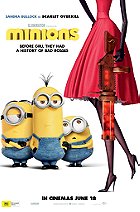


 0 comments,
0 comments, 